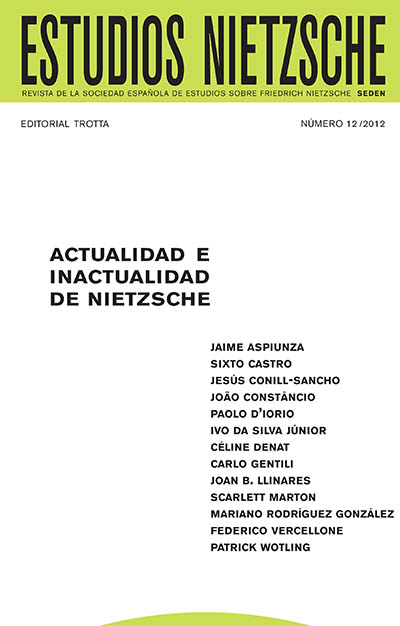Nietzsche and Schopenhauer: On concepts and signs
DOI:
https://doi.org/10.24310/EstudiosNIETen.vi12.10554Keywords:
concept, sign, Schopenhauer, wordAbstract
The aim of this paper is to show that by interpreting the similarities and differences between Nietzsche and Schopenhauer’s views on concepts and signs one can clearly see how Nietzsche attempts to overcome some of the most fundamental problems of epistemology and ontology raised in modernity — that is to say, why his philosophy is, in many respects, already «contemporaneous». I start by presenting six of Schopenhauer’s
main theses on concepts and signs and then six parallel theses put forward by Nietzsche. The latter may seem to be identical to the former, but in the end they prove to be radically different. My main point is that Nietzsche’s conception of words and concepts in terms of «signs» owes a great deal to Schopenhauer — and yet it represents a radical shift of perspective in relation to Nietzsche’s «master» and indeed in relation to the whole of modern philosophy.
Downloads
Metrics
References
Constancio, J., «Consciousness, Communication, and Self- Expression: Towards an Interpretation of Aphorism 354 of Nietzsche's The Gay Science», en J. Constancio y M. Branco (eds.), As the Spider Spins: Essays on Nietzsche's Critique and Use of Language, Berlin/Boston: Walter de Gruyter, 2012.
Constancio, Joao, «On Consciousness: Nietzsche's Departure from Schopenhauer»: Nietzsche-Studien 40 (2011), 1-42.
H. Arendt, H., Lectures on Kant's Political Philosophy, Chicago: The University of Chicago Press, 1992.
Nietzsche, F., Obras Completas, I-IV (OC ). Director ed. Diego Sánchez Meca. Madrid: Tecnos, 2011-2016
Nietzsche, F., Correspondencia I-VI. (CO). Director ed. Luis E. de Santiago Guervós. Madrid : Trotta, 2005- 2012.
Nietzsche, F., Fragmentos Póstumos I-IV (FP). Director ed. Diego Sánchez Meca. Madrid: Tecnos, 2006-2010.
Schopenhauer, W., El mundo como voluntad y representación, trad., introd. y notas de Pilar López de Santa María, Trotta, Madrid, vol. I: 22009; vol. II: 32009.
Simon, J., «Das Problem des Bewusstseins bei Nietzsche und der traditionelle Bewusstseinsbegriff», en M. Djurig y J. Simon, Nietzsche in der Diskussion, Zur Aktualitat Nietzsches, vol. II, Würzburg: Konigshaus, 1984.
Stegmaier, W., «Nietzsches Zeichen»: Nietzsche-Studien 29 (2000), 41-69.
Downloads
Published
How to Cite
Issue
Section
License
As of issue 21 (2021) this journal is published only in open access (diamond route).
From that number 21, like the previous numbers published in NIETZSCHE STUDIES, they are subject to the Creative Commons Acknowledgment-NoComercia-ShareIgual 4.0 license, the full text of which can be consulted at <http://creativecommons.org/licenses/by-nc-sa/4.0 >
It is the responsibility of the authors to obtain the necessary permissions of the images that are subject to copyright.
This work is licensed under a Creative Commons Attribution-NonCommercial-ShareAlike 4.0 International License.
Copyright generates two different rights: moral rights and patrimonial rights that EJFB recognizes and respects. Moral rights are those relating to the recognition of the authorship. They are rights of a personal nature that are perpetual, inalienable, unseizable and imprescriptible as consequence of the indivisible union of the author and his/her work.
Patrimonial rights are those that can be derived from the reproduction, distribution, adaptation or communication of the work, among others.







11.png)
